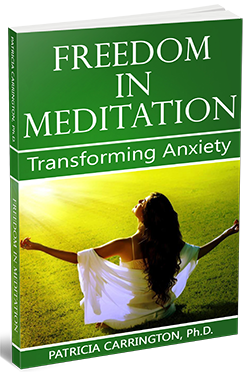Problems in the Use of Meditation
Patricia Carrington, Ph.D.
Author of “The Book of Meditation”
Enjoyment constitutes a problem for many people. The idea that we should occupy our time with ‘useful’ pursuits is widespread. A businessman may come home to rest over a weekend, only to find himself compulsively catching up on chores around the house, and may end up spending the entire weekend working. Even if he plays golf or tennis, he may make ‘good use of his time’ by trying to improve his game or make business or social contacts. Many people work themselves into exhaustion while supposedly playing. At that point they feel harassed, cornered, and may try to escape from the whole process by ‘knocking themselves out’.
Drinking is one escape from such tension. Attaching oneself to a TV set or newspaper is another. Our society has any number of escape devices which help us lapse into total passivity and be relieved of responsibility. They are necessary safety valves for us if living is merely a mechanical duty rather than a joyous process.
Meditation stands quite apart from this round of work versus escape. It is a moment of actual presence, an aliveness which exists for its own sake and needs no justification. It goes beyond the requirements of mere survival, either material or social, and opts for joy.
The Indian spiritual leader Bhagwan Shree Raineesh suggested that existing in the material world is but an ‘emergency measure’ and that the true goal of man ‘is always to come to the flowering of the potential of all that is meant by you’. This flowering can only come about if you add a new dimension to your life, the dimension of the ‘festive’: [Meditation] is not work; it is play . . . in business the result is important. In festivity, the act is important . . . any moment can be a business moment; any moment can be a meditative moment. The difference is in attitude. If it is choice less, if you are playing with it, then it is meditative.10
It is precisely what Rajneesh calls the ‘festive’ attitudes – free and playful spontaneity, doing things for their own sake – that is often condemned in our society. The old dictum ‘Satan finds mischief for idle hands to do’ may be outdated, but its spirit lives on. It is not at all unusual for meditators to report that they feel they have no right to feel as ‘good’ as they do when they are meditating, or afterward. It may even be frightening for them to feel happy and at peace. Such people may believe they stop meditating because of practical reasons, but the underlying cause usually becomes clear if you discuss their practice with them. Their attitude about meditation is quite different from that of those who stop meditating because they find it unpleasant – typically, these people have nothing but praise for meditation.
People afraid to experience the fulfillment that meditation offers often manage to put themselves into a position where it is impossible for them to meditate properly. One woman, who had learned meditation and claimed to enjoy it thoroughly, consistently complained that she could never obtain a peaceful meditation at home and therefore rarely meditated. On questioning, it turned out that when she did meditate it was always in the family room of her house at a time when her husband and children were present. A peaceful meditation under these conditions was impossible and by selecting this time and place for her meditation she was depriving herself of a fulfilling experience. She could have gone to her bedroom and locked the door, or she could have meditated in the early afternoon when she first returned from work to an empty house, or even late at night, but she did none of these things. What was more; she resisted any suggestion by her meditation teacher or friends that she handle her problems constructively. She was an intensely self-denying woman – meditation promised too much happiness.
The psychotherapists I know who use meditation with their patients have all reported observing certain patients who cannot tolerate the pleasantness of this state. Dr Bernard Glueck, for example, noticed that some patients in the Institute of Living study seemed unable to accept the pleasurable feelings which resulted from meditation and that they frequently stopped meditating rather than face the guilt that this practice brought to them.11
Because meditation is so inherently pleasurable, certain people may even stop meditating in order to punish themselves. A meditator describes this process when she speaks of meditation as being a form of reward:
It’s the same way you would reward yourself with candy or whatever. . . . Meditation is gentle, it’s a good thing, a journey within. But if you feel you’ve behaved badly, you will use meditation as a weapon and say to yourself, ‘No! You will not go to meditate! You don’t deserve it! You have no right to feel that good!’ . . . You don’t even meditate badly at such a time. You don’t meditate at all . . . 12
The pleasure-giving aspects of meditation may also cause special anxieties in people who have been taught to feel guilty about masturbating. It is possible unconsciously to view meditation (an experience where one is alone and gives oneself pleasure) as a ‘forbidden’ experience, similar to masturbation.
For people with masturbation guilt, something all too common in our society, meditation may be avoided because when practiced it may now create anxiety rather than bring about relaxation.
If allowed to continue long enough, of course, meditation itself often helps to lessen even deep-seated guilt, because it tends to reduce self-blame. If a person allows herself to keep meditating for months or years, the meditation may automatically lessen her guilt about enjoying life or about sexual fulfillment. Of course it also may not do so. In this case, professional help in handling these problems should be sought.
These are some of the reasons we have discovered so far for people dropping out of meditation. It is instructive to look at the research evidence on this subject. One investigator who has studied this problem is Dr Leon Otis of the Stanford Research Institute. His research suggests that those who start meditating and then quit may have very different personalities from those who stick with the practice.13 In the first part of Otis’s study, questionnaires were sent to two groups of people who had previously learned Transcendental Meditation (TM)– one chosen at random from the TM organizations records, the other composed of TM teachers in training. In the second part of the study, the subjects were people who had volunteered to learn TM at the Stanford Research Institute. The questionnaire used asked about a person’s history in practicing TM, any physical or behavioral changes experienced since starting it, and any changes in basic aspects of personality that the meditator had noticed since commencing to meditate. The basic personality changes were judged from the words a person chose, from a long list, to describe himself.
The results of these studies showed that the dropouts from meditation tended to think of themselves as withdrawn, irritable and anxiety-ridden. They checked adjectives such as moody, worried, impatient, insecure, defensive, self-conscious, perplexed or ‘a loner type’ to describe themselves.
People who had been meditating for less than six months and who were continuing to meditate, described themselves positively and thought meditation helped them. They tended to see themselves as being excitable, prompt, zestful, self-controlled, ambitious and alert people.
The meditators who had been practicing meditation consistently for eighteen months or more had a still different view of themselves. They described themselves as being peaceful, alert, determined, attractive, secure, self-confident, considerate, renewed, pleasant, candid, precise and warm – very positive attributes indeed.
Is this because meditation produced all these changes in the long-term meditators, or did these two groups differ from each other even before they started learning meditation? Otis’s results suggest the possibility that it is only those people who are strongly attracted toward the calm way of life in the first place who will tend, once they commence meditation, to stick faithfully with the practice. More insecure or troubled people may abandon meditation, perhaps because it is not helping them or perhaps because they cannot assimilate the help it does have to offer. It certainly does not take as much dedication, strength of character or predilection for a practice to continue to do it for six months or less, as it does to remain regularly with it for a year and a half or more; many people will start things, but relatively few stay faithfully with any discipline over a long period of time. Is this perhaps the reason why the six months-or-less group showed such different personality characteristics from the long-term meditators?
The Otis study showed that different people respond differently to meditation, stay with it for different amounts of time, and report different benefits from it. His results, taken together with our clinical observations, suggest that no blanket statement can accurately describe the situation. To assume that everyone can-needs to, or even wants to meditate seems unwarranted. At the same time, it is becoming increasingly obvious that meditation is extremely useful for many people.
1. B. S. Rajneesh, Dynamics of Meditation (Bombay: A Life Awakening Movement Publication, 1972), pp. 60–62.
2. B. C. Glueck, ‘Current Research on Transcendental Meditation’ (paper delivered at Rensselaer Polytechnic Institute, Hartford Graduate Center, Hartford, Connecticut, March 1973)
3. Meditation Journal of Sarah Eaton (personal communication).
4. L. S. Otis, ‘The Psychobiology of Meditation: Some Psychological Changes’ (paper presented before the Annual Meeting of the American Psychological Association, Montreal, 1973).
Related Product:
 Dr. Patricia Carrington’s award winning meditation technique CSM (Clinically Standardized Meditation) is a clinically sensitive meditation method used by numerous medical institutions, organizations, and individuals worldwide. The main advantages of CSM (and also its difference to other forms of techniques of meditation) are its simplicity, its flexibility and its sensitivity to the individual needs and inclinations of the people who learn it. CSM is extremely permissive, which makes it easier to personalize and internalize the technique and its experience.
Dr. Patricia Carrington’s award winning meditation technique CSM (Clinically Standardized Meditation) is a clinically sensitive meditation method used by numerous medical institutions, organizations, and individuals worldwide. The main advantages of CSM (and also its difference to other forms of techniques of meditation) are its simplicity, its flexibility and its sensitivity to the individual needs and inclinations of the people who learn it. CSM is extremely permissive, which makes it easier to personalize and internalize the technique and its experience.






